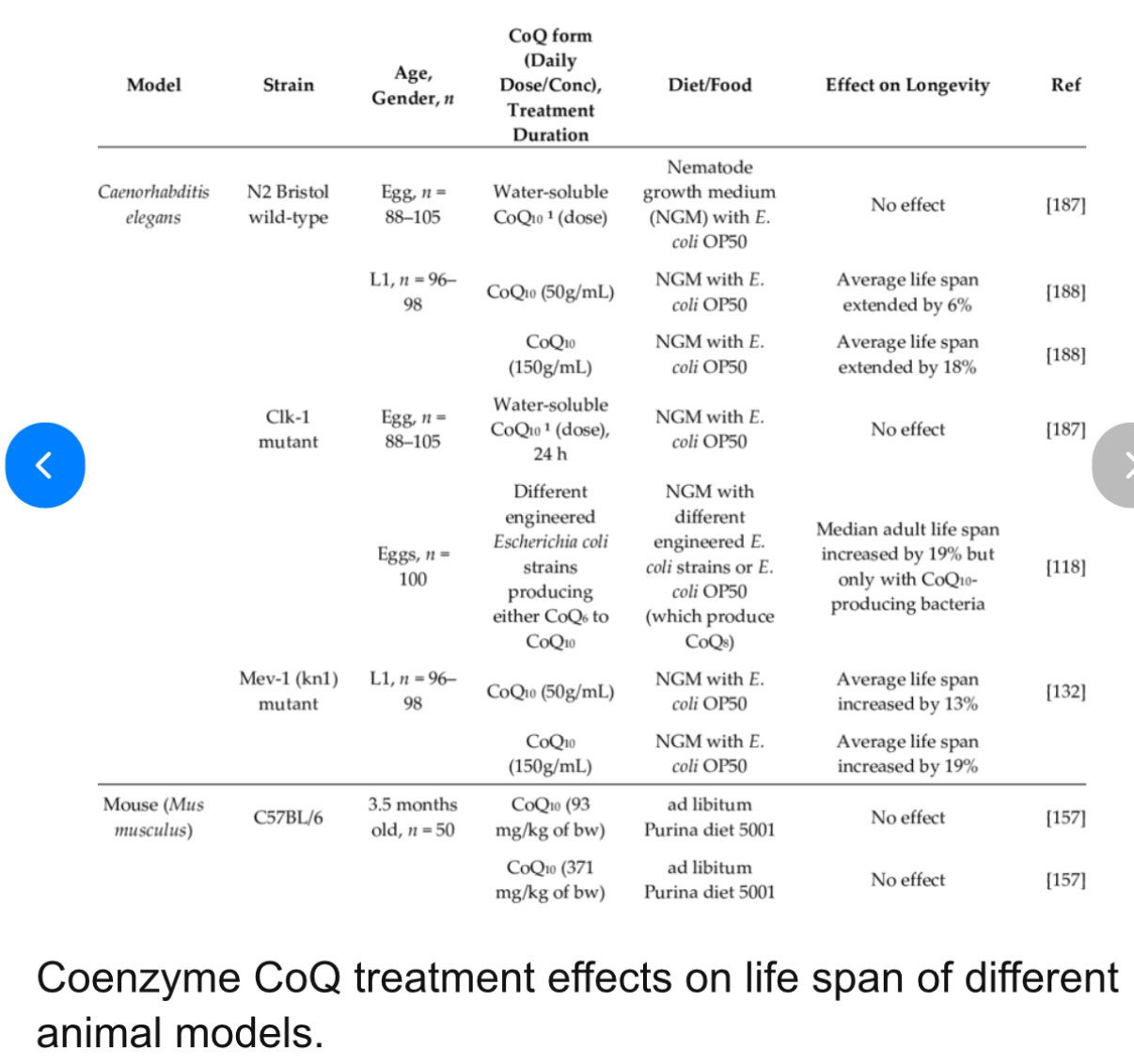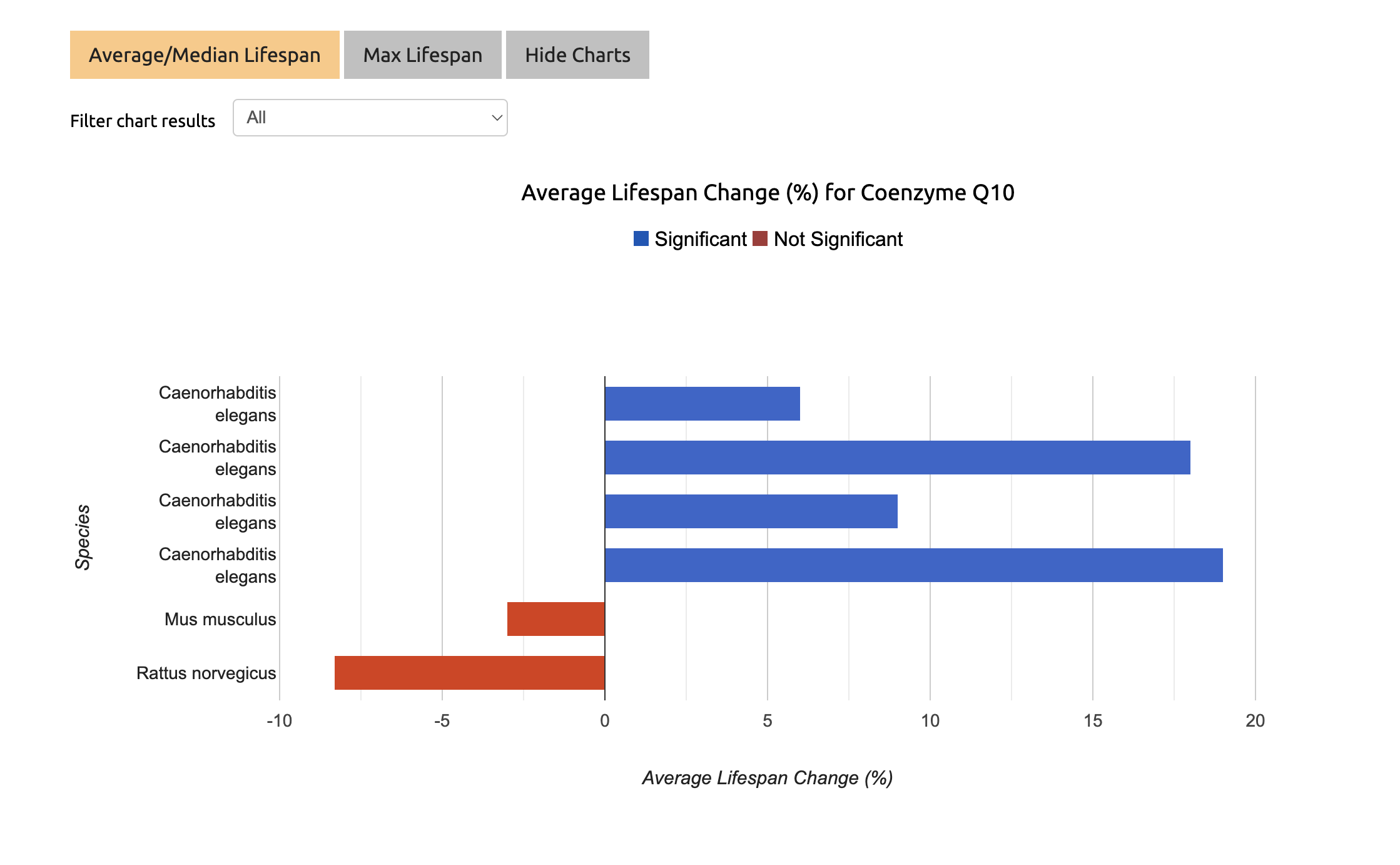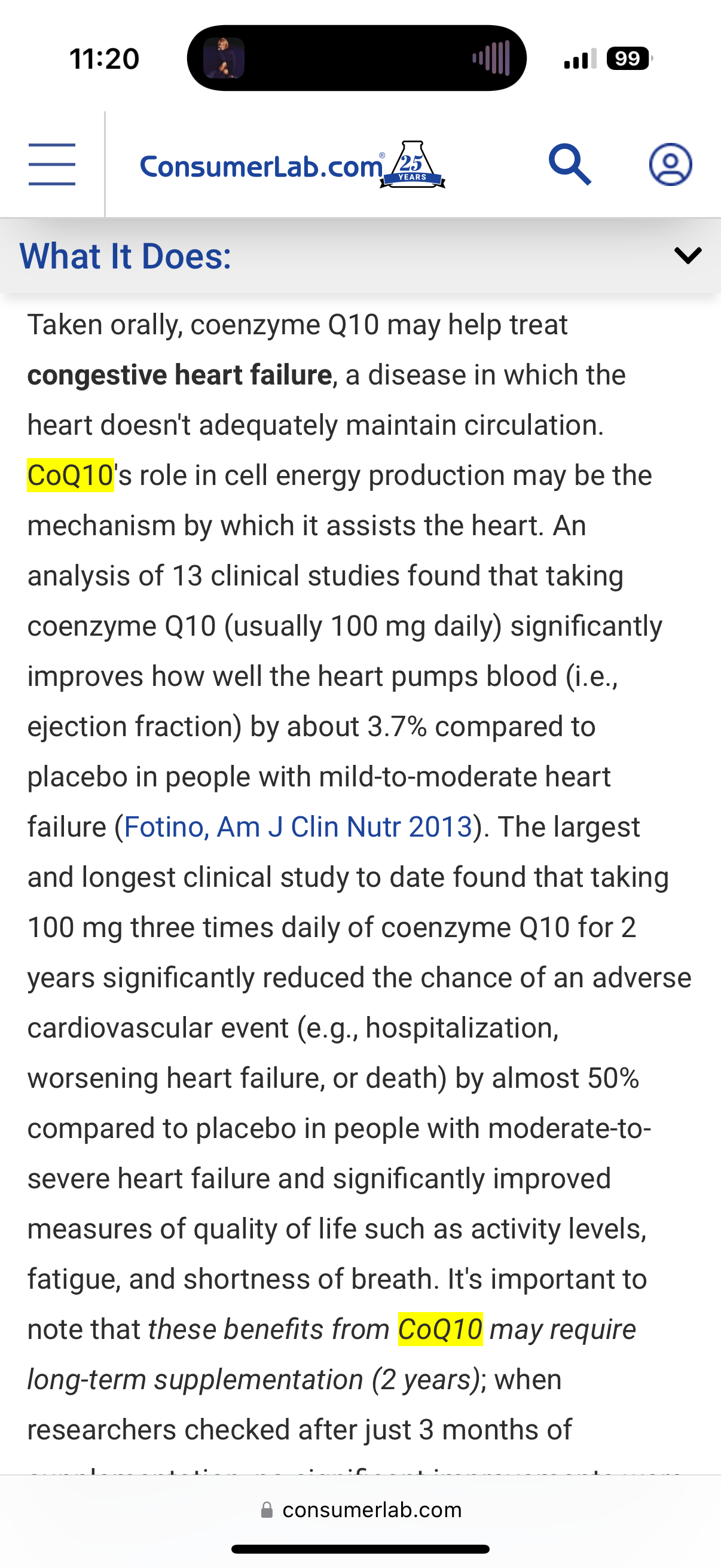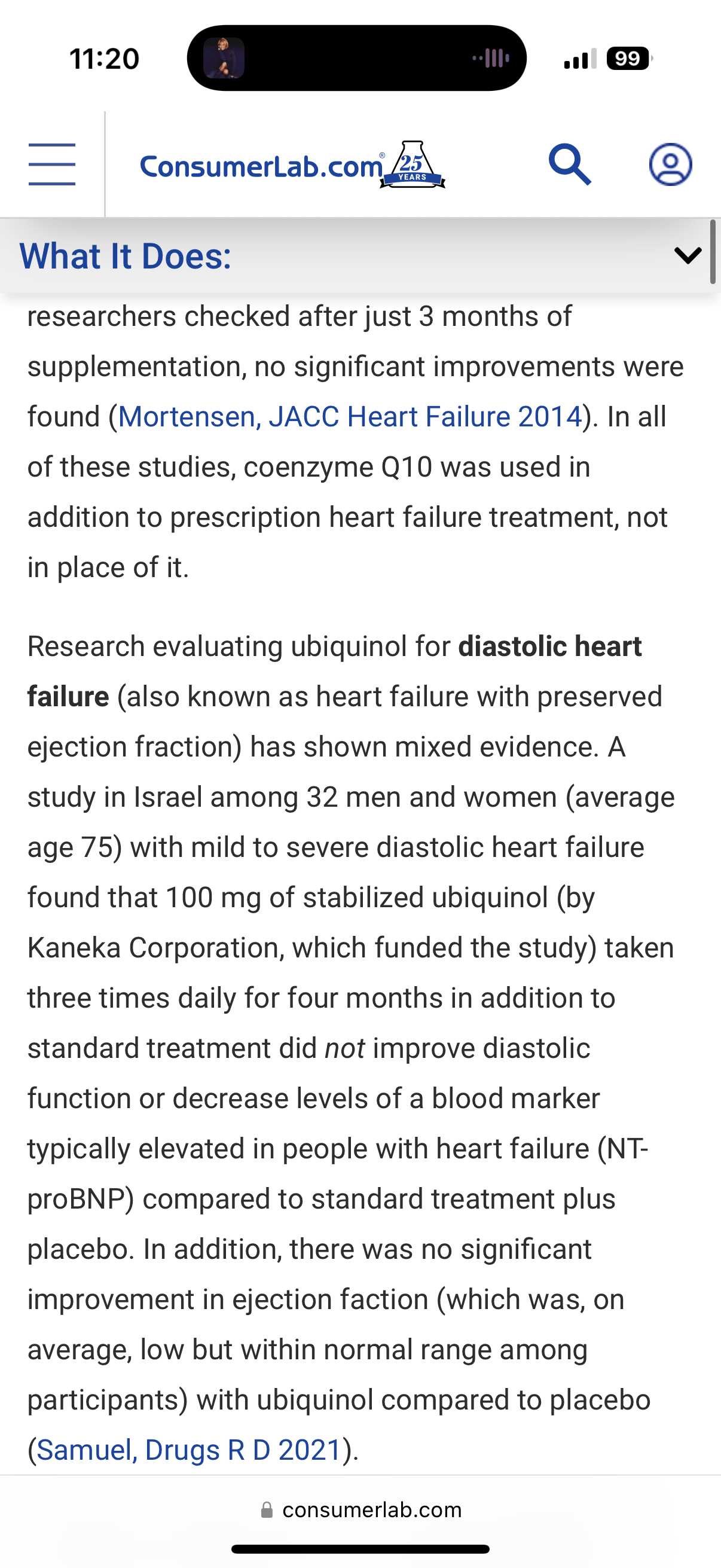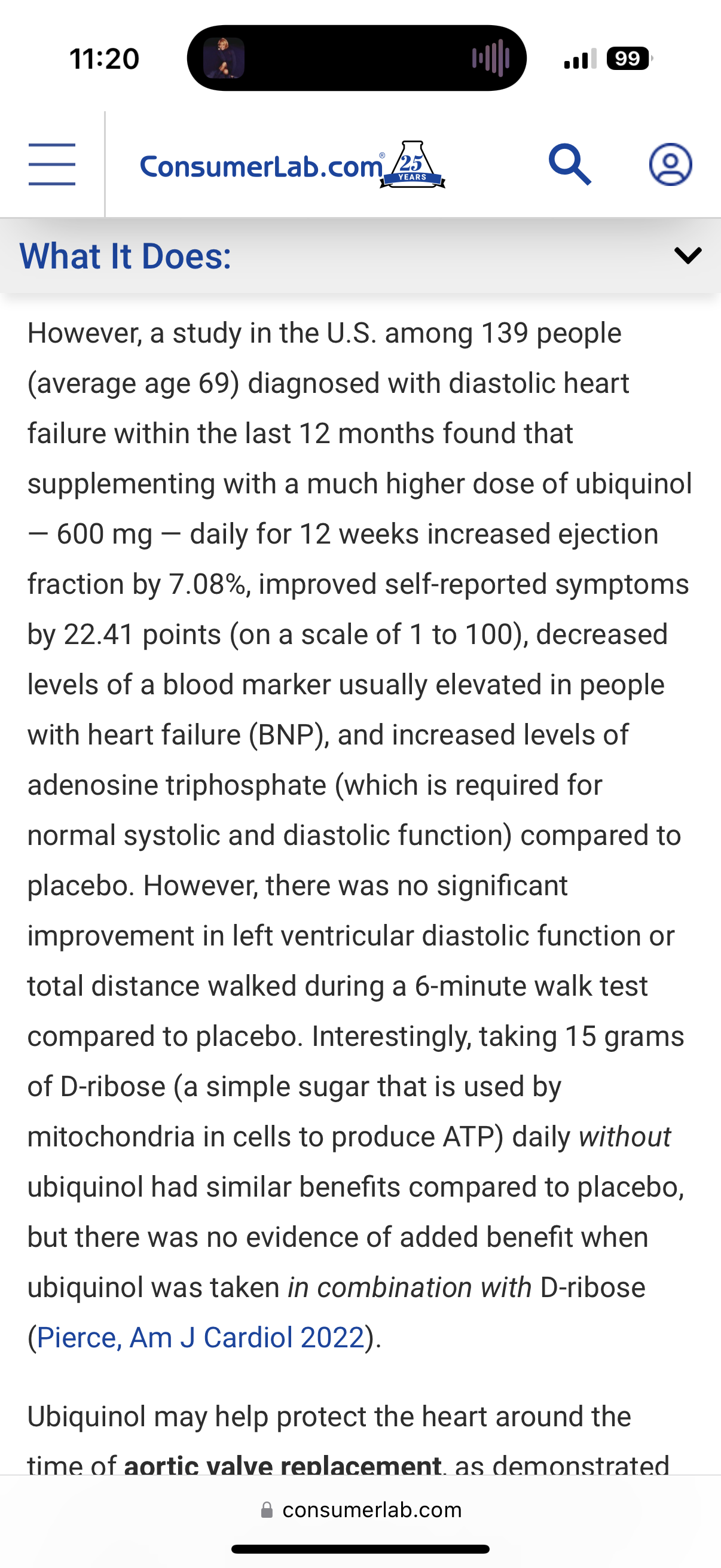@adssx not all the animal studies are negative.
What’s your source? And why doesn’t it include negative results?
Here’s mine: Coenzyme Q10 and its possible anti-ageing properties
Shorter lifespan in mice and rats + lack of positive RCTs in humans = end of the story. No matter how many positive results you have in C. Elegans.
@adssx This is a great and important idea. How to proceed? Even though I have shrunken my list dramatically I’m sure I’m still wasting my money. I just hope I’m not wasting my health.
Feel free to create a new topic “Challenge my stack” (or whatever other name)!
A part of me is throwing softballs out there for you because I know you’re gonna bring good information in response ![]()
You’ve done a good job. You ALMOST convinced me to stop taking it. Almost.
And yet, according to the study cited above, a four-supplement cocktail that included COq-10 helped children recover from mitochondrial deficiencies. The lead researcher, Dr. Mark Tarnopolsky of McMaster University, says the cocktail can also help our senior citizens, who may have some of the same deficiencies.
So if you have those deficiencies, that cocktail is useful. How does that relate to taking out just one of the four ingredients, and using it for… something? If someone sees benefits, that’s fantastic, and more power to them. Meanwhile, those who are looking at CoQ(10) as a supplement candidate would be better informed through studies showing some defined health benefits. Not claiming that none exist, only hoping to see evidence.
All four supplements were chosen by an extensive review of the literature, followed by experimentation with the safest and most promising prospects. I think any one of the four, singly or in combination, will have positive effects on health.
Can you please link to the research paper? (not the YouTube video)
Is there another paper confirming the findings? (remember that a third of research papers are fraudulent and another third is just wrong…)
If Q10 was so good it would have been tested loooooong ago in the ITP.
I think this is a case where rodent data is a bit questionable. Humans primarily produce CoQ10 while mice and rats produce much more CoQ9. CoQ9 is similar but not the same and when rodents evolved to use CoQ9 more than CoQ10 we can’t necesarily give CoQ10 to rodents and expect the results to reflect what would happen in humans. Negative or null results from CoQ10 in rodents might be caused by CoQ10 simply not being benficial, or it might in part be because the rodents need more CoQ9 than CoQ10. Maybe excess CoQ10 has more negative effects in rodents than humans. It’s hard to say without more data.
A few among the many:
https://www.sciencedirect.com/science/article/abs/pii/S1357272514000375
https://www.jpeds.com/article/S0022-3476(20)31170-7/fulltext
These papers don’t prove anything. The first is a review by a single author. The second is an editorial commenting on another paper.
I don’t care to go through them all, but the volume of papers says something. They have proven a strong association between the mito and CoQ-10. It’s at least as strong as the science debunking the Shroud of Turin.
Exactly: despite a massive amount of research on Q10… nothing has been found so far!
CoQ10 supplementation doesn’t even work in people with CoQ10 deficiency! The efficacy of coenzyme Q10 treatment in alleviating the symptoms of primary coenzyme Q10 deficiency: A systematic review 2022
That’s why Brad Stanfield included it in its list “Which Popular Supplements Should You Actually Try to Avoid?”
The second group of supplements I would not take are anti-inflammatories like CoQ10 and PQQ. When we exercise, we release oxidants and inflame the body. This is a natural process that we don’t want to interfere with because it signals the body to become more efficient (in other words, build muscle strength).
A randomized trial found that CoQ10 supplements after exercising dramatically reduced the benefits of exercise compared to a control group. There’s also no good evidence of benefit from CoQ10, with studies finding no value in preventing cancer or heart disease. Plus, there’s good evidence that patients on statins don’t get any benefits from CoQ10.
One day, CoQ10 might be proven to be highly beneficial. But as of today it’s not the case.
For mitochondrial health, I’m interested in:
- Nicotinamide riboside
- Urolithin A
- SGLT2 inhibitors
- Sirolimus
- N-Acetylcysteine (NAC)
But even those are not fully clear/confirmed/proven.
Interestingly, this paper here shows a slight increase in exercise capacity, contradicting the 1997 study of young men performing sprints
“ Our study reveals the effect of a short term ubiquinol supplementation (200 mg/day for 2 weeks) on muscle performance and muscle damage in healthy, moderately trained subjects. In the UG, there is an increase in average load and repetitions and a decrease in perceived exertions as a general trend, revealing an improvement in muscle performance. Ubiquinol supplementation also reduces muscle damage markers, showing a protective effect on muscle fibers after strenuous exercise.
Therefore, this study firstly provides evidence pointing out that short term ubiquinol supplementation improves muscle performance and prevents muscle damage after strenuous exercise, especially in trained but non-elite athletes, or participants with a high training routine.”
From Dr. Paddy Barrett’s new sub stack
“ Co-Enzyme Q10 is often suggested for reducing muscle aches and joint pains related to statin therapy.
I do not use it for this purpose for two reasons.
- The majority of statin-associated muscle aches are related to the nocebo effect so we just end up chasing our tail.
- If someone develops muscle aches or joint pains on statin therapy, I just switch them to something else after an appropriate period of retrial with an alternate or lower dose of statin therapy.
The study mentioned above showed that supplementation with Co-Enzyme Q10 resulted in a 32% reduction in all-cause mortality, i.e. the chances of dying from any condition, not just heart disease.
This is a spectacular reduction in all-cause mortality risk.
So why not just put it in the water supply?!
The reason is that the evidence for this benefit comes from the supplementation of Co-Enzyme Q10 in those with heart failure, not the general population.
So why not use it in heart failure patients?
It is probably a pretty low-risk intervention, but even though the graphic above highlights the benefit in a green box, therefore suggesting at least a moderate level of evidence, it still does not meet the bar for broader use.”
You forgot his conclusion on Q10:
It also seems rather implausible that a supplement could make such a spectacular difference to all-cause mortality risk.
Usually, when something seems too good to be true, it probably is.
I didn’t include that part because it was just his opinion.
I only wanted to share that data on CoQ10.
My opinion, however, is that anyone facing the threat of heart failure should be taking it. The upside exceeds the risk so even if it doesn’t work, there’s no harm in trying.
For the general population, it might not be as necessary.
Yes in heart failure it might make sense. This recent meta analysis found benefits: Efficacy and safety of coenzyme Q10 in heart failure: a meta-analysis of randomized controlled trials | BMC Cardiovascular Disorders
But they don’t mention the dose and for Q10 it seems essential.
